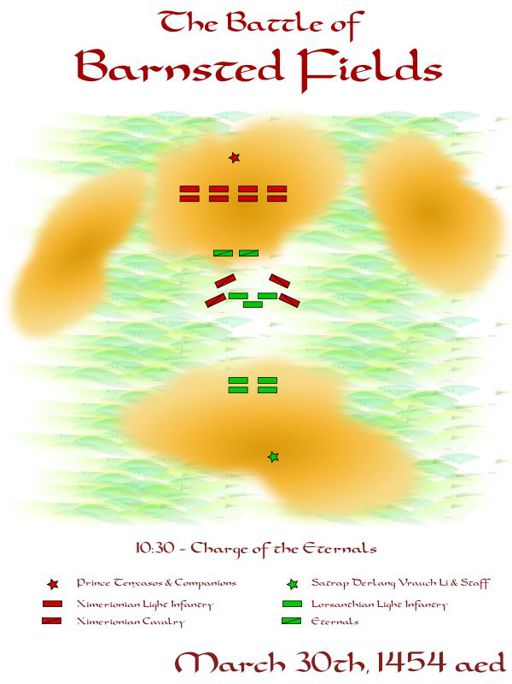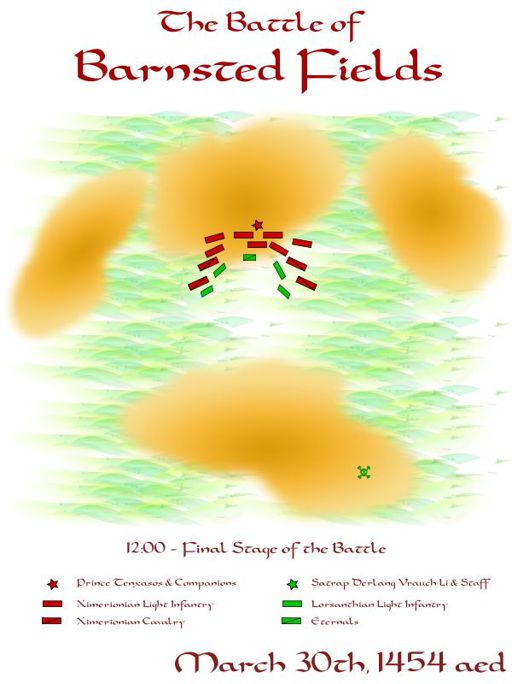The Invisible Hands - Part 1: Gambit (69 page)

Some of the Eternals on horseback tried to turn around again, making the confusion even greater. Wounded animals neighed excruciatingly, making the other horses balk and buckle. Riders started falling off their steeds, and encumbered as they were by their heavy armor, were an easy prey for the Ximerionian soldiers, who finished them off with swords and daggers.

Derlang Vrauch-Li watched on in horror as his elite troops were slaughtered. The rest of the army was, restrained by their strict discipline, waiting for the sign to attack. When the whole of the Ximerionian army came at them, the satrap had no other choice left than to order his men to meet them. The chances were uneven. The Lorsanthian soldiers were dog-tired and totally demoralized. With the losses they had sustained during the opening onslaught and the Eternals in more trouble than they could handle, they were also inferior in numbers.
They resisted as much as they could and fought like lions, but the outcome was never in doubt. After half an hour Derlang came to the conclusion that the battle, although still bitterly contested, was slowly but inevitably being lost.
He left his command position, ordering an adjutant to accompany him to his tent. Once inside, the satrap started removing his armor while his aide-de-camp stared at him in surprise.
“The battle is lost. In an hour at the most it will be over,” Derlang said, his voice firm.
“There’s still time, Your Highness. We’ll leave the baggage train, take the fastest horses and the best men. In less than two days we can be back—”
“You know I can’t return home. Not like this. Not after having lost my army to those… those savages. You know what punishment the
Purple Room reserves for gross failure like this.”
“But, Your Highness—”
“No,” the satrap cut him short, “this is it. I must think about my House now. Besides, I don’t exactly relish the prospect of the Death Without End.”
“If you fall in battle, or take your own life, the Purple Room will let your family live, but…”
“I know. They will take everything away from them. Titles, possessions, lands. They’ll be lucky if they aren’t sold as slaves.” Derlang 58
curled his lip in a wry sneer. “His Divinity needs to set an example, so
that his other satraps know that the punishment for defeat is higher than mere death.”
He took an intricately engraved golden bracelet from his wrist and handed it over to his adjutant, who recoiled in horror.
“Graulam, there’s no time for this. It’s just a trinket.”
“It used to be the royal armilla of your forefathers, Sire.”
Derlang didn’t look his adjutant in the eyes, but turned away and sat down at a little table. He scribbled some words hastily on a wax tablet, closed it and, standing up again, handed it over.
“We haven’t been independent kings for over a hundred and
twenty years, Graudam. I need you to do all you told me earlier I should do. Take the fastest horses, the best and most dependable men.
But without me. Don’t return to Tyleme. Go straight to my wife. Give her the bracelet and the wax tablet. She’ll believe you. Take her and my sons over the border. Make for the Rhonoman Influence. Most of our fortune is in diamonds and other precious stones. I’ve told my wife to give you one tenth.”
Graulam wanted to protest, but he too could see there was no way out anymore for the unlucky satrap. He clicked his heels together and bowed his head. He raised it again when he heard the sound of a sword being taken out of its scabbard.
Derlang handed it to him, hilt first.
“I can’t do it myself. I should, but I can’t. I need you to run me through. Make it quick, and afterward put my hands around the hilt.
Then leave.”
Graulam faltered.
“Your Highness… Sire… I—”
58
“Do it, Graulam. Now. There’s not much time. Before long the enemy will have surrounded this hill, and all escape will have become impossible.”


“Too soon,”
was Graulam’s first thought as he exited the satrap’s tent and overlooked the battlefield.
“You had me kill you too soon.”
Then he understood he was wrong and why.
The Ximerionian army was seemingly routed, and, though exhausted, the Lorsanthian troops, forgetting all caution and disregarding discipline, let themselves be lured into breaking ranks and chasing them. The enemy light cavalry closed in on the reckless Lorsanthians from the left and the right, while the Ximeronian infantry stopped fleeing and turned around, forming a massive wall of swords and axes.
“The oldest trick in the tactician’s book,” Graulam murmured, “and they fell for it.”
It was over.
He ran to the pen where the satrap and his guards’ horses were kept. Gathering a few of his finest soldiers, he barked his orders.
Minutes later, taking advantage of the confusion of a disintegrating Lorsanthian army and Ximerionian exuberance at their all too easy victory, the adjutant and his men galloped off the southernmost end of the hill.
58
Prince Tenaxos had been highly visible during the battle. Highly
visible and unreachable for enemy arms. His companions had seen to that. They had been fighting in the thick of it, but the prince himself had at all times been surrounded by a living wall of his knights, at least three men thick. When the Lorsanthian soldiers began laying down their weapons and surrendering in droves, he retired with a few friends behind his troops.
“Wendo, take some men and go guard the enemy baggage train.
Non-combatants are not to be hurt under any circumstances,” he ordered.
One by one he sent away his companions on several assignments to handle the surrender.
At last he was left with just two of them. Tenaxos removed his breastplate and had Seph of Gisswing help him out of his mail shirt.
“Erning,” the prince said, turning his left side to him, “draw your sword.”
“What? Tenax?”
“Draw your sword and cut my left upper arm, deep enough to draw blood.”
“No,” Erning of Grenvall cried out instinctively. “Why?”
“Little brother was wounded at the Zinchara, and I’m not going to let him hold that over me.”
Erning still hesitated.
“Do it, Erning. Make it quick,” the prince repeated his order.
“Do it, Erning,” Seph of Gisswing echoed Tenaxos, encouraging his friend. “He’s right. Besides, a prince of the House of Tanahkos shedding his blood for the people is good propaganda. Stuff for ballads.
Wait until the minstrels hear about this.”
58
“We have minstrels following the army,” the prince said. “Believe
me, they have not only heard about the battle, they saw it. From a distance, anyway. This evening I must be able to show them my wound from close by. I will explain to them what happened in the heat of the struggle. How else will they be able to describe the battle accurately?”
Tenaxos smiled innocently at his companions.
Erning of Grenvall nodded. He drew his sword, brought it up to Tenaxos’s upper arm, and closing his eyes made a long-drawn cutting motion.
The prince winced and hissed with the unexpected intensity of the pain. He grabbed at the wound with his right hand, squeezing it. Blood oozed through the gaps between his fingers. He wiped his hand on his right cheek.
“Call a medic and have him bandage this,” he groaned.
Seph ran away.
“What’s this place called? Do you have any idea?” Tenaxos asked of Erning, who looked as white as himself.
“Eh… yes. I believe the locals call it Donkey’s Hills.”
Tenaxos looked at him with disdain in his eyes.
“Donkey’s Hills? The Battle of Donkey’s Hills? I don’t think so.”
“What? Why?”
“That would remind people too much of the Battle of the Karmenian Hill, won by my grandfather,” Tenaxos replied with a mocking sneer. For a few moments he stood thinking silently. “What’s that hamlet called we passed yesterday?”
“Do you mean Barnsted? That’s almost fifteen miles from here. It’s abandoned, or as good as,” Erning of Grenvall answered.
59
“Fifteen miles? Close enough. This victory shall be known in the
chronicles as the Battle of Barnsted Fields. No hill, no river. Fields.”
When a medic arrived, out of breath, Tenaxos ordered the man to cut away his sleeve as high as possible and to use light bandages.
“The wound is not deep, Your Highness, but I would advise several layers. Otherwise the blood will seep through.”
“Light bandages, man. One layer only. Do as you’re told.”
While the Eternals fought and died where they stood, the
Lorsanthian troops who had surrendered were rounded up.
Tenaxos and his companions rode over to the camp of the enemy.
The prince was satisfied to notice that Wendo of Offlighem had seen to the protection of the servants, slaves and concubines. A soldier brought him and his three closest friends to the tent of the Lorsanthian commander. The prince gazed long and hard at the dead figure, sitting in a chair, his hands on the hilt of the sword that stuck out of his chest.
“At least he has taken the honorable way out,” he said finally, sitting down on one of the chairs at the table.
“Look what I’ve found,” Wendo said with a big grin. He held up a golden flask. He removed the stopper and smelled at it. “I’ll say one thing for our esteemed enemy: he didn’t deny himself the finer things in life just because he was going to war. Let’s drink to his shade. He won’t mind.”
“To the victor the spoils,” Seph, who had found silver cups in a movable cabinet, added.
The four friends drank to a propitious day, holding their cups high in the direction of the corpse.
“You think that’s it? We’re rid of Lorsanthia?” Seph asked.
59
“Oh, I would reckon not,” Tenaxos replied in an offhanded way.
“They will send a second army sooner or later. A bigger one, I would think. What’s more, they will have drawn lessons from this debacle.
But we should be all right for at least a few months, maybe half a year.”
His three companions stared at him.
“Come on guys, Lorsanthia is a giant. You knew that didn’t you?
Were you under the impression they would be discouraged by one set— back? Surely not.”
“So, what will we do?” Erning of Grenvall asked, licking his lips.
“We’ll prepare. It doesn’t matter that they know about our hit-and-run-tactics. There is nothing they can do about them, provided we can keep the pressure up. The Arkhasaro Valleys will remain soggy and treacherous.”
“Yes, but their engineers will bridge them or find another way to safely ford them,” Wendo countered.
“Just a new target for us. Think about it: the bigger the army they send, the more difficult it will be for the Lorsanthian commanders to manage it. By the time we’re finished, they won’t be able to live off the land. We’ll lodge ourselves firmly in the lower flanks of the Morradennes. We’ll be as good as invisible to them. They can only send out small units against us, and they won’t know the terrain as we do.”
“It could take years before they give up,” Wendo replied, not
convinced.
“Not necessarily. Don’t forget Father and his army. He can confront them right on, in regular battle, while we will be free to mount attacks whenever and wherever we want. We can deny them their supplies and provisions. We’ll lay waste to all lands between the border and Nira. If need be we’ll poison the wells.”